英语散文赏析《落花生》双语散文阅读
- 格式:docx
- 大小:14.98 KB
- 文档页数:3
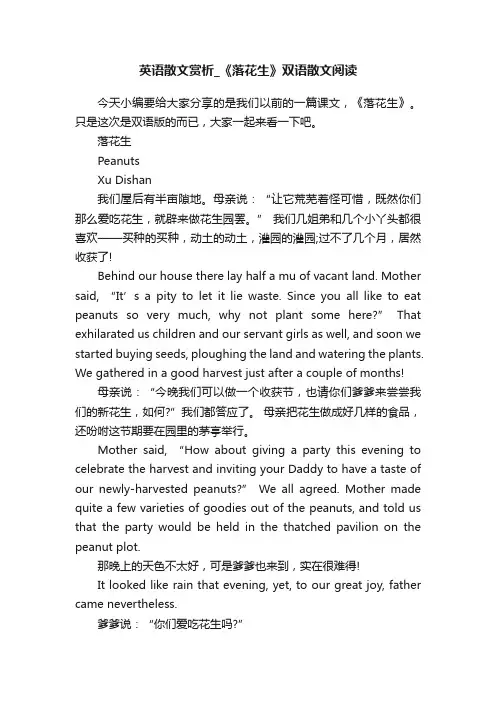
英语散文赏析_《落花生》双语散文阅读今天小编要给大家分享的是我们以前的一篇课文,《落花生》。
只是这次是双语版的而已,大家一起来看一下吧。
落花生PeanutsXu Dishan我们屋后有半亩隙地。
母亲说:“让它荒芜着怪可惜,既然你们那么爱吃花生,就辟来做花生园罢。
” 我们几姐弟和几个小丫头都很喜欢——买种的买种,动土的动土,灌园的灌园;过不了几个月,居然收获了!Behind our house there lay half a mu of vacant land. Mother said, “It’s a pity to let it lie waste. Since you all like to eat peanuts so very much, why not plant some here?” That exhilarated us children and our servant girls as well, and soon we started buying seeds, ploughing the land and watering the plants. We gathered in a good harvest just after a couple of months!母亲说:“今晚我们可以做一个收获节,也请你们爹爹来尝尝我们的新花生,如何?”我们都答应了。
母亲把花生做成好几样的食品,还吩咐这节期要在园里的茅亭举行。
Mother said, “How about giving a party this evening to celebrate the harvest and inviting your Daddy to have a taste of our newly-harvested peanuts?” We all agreed. Mother made quite a few varieties of goodies out of the peanuts, and told us that the party would be held in the thatched pavilion on the peanut plot.那晚上的天色不太好,可是爹爹也来到,实在很难得!It looked like rain that evening, yet, to our great joy, father came nevertheless.爹爹说:“你们爱吃花生吗?”“Do you like peanuts?” asked father.我们都争着答应:“爱!”“Yes, we do!” we vied in giving the answer.“谁能把花生的好处说出来?”“Which of you could name the good things in peanuts?”姐姐说:“花生的气味很美。
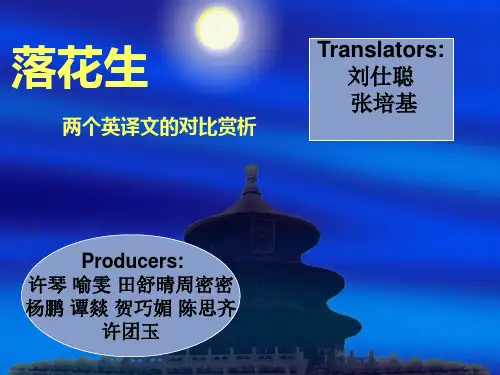
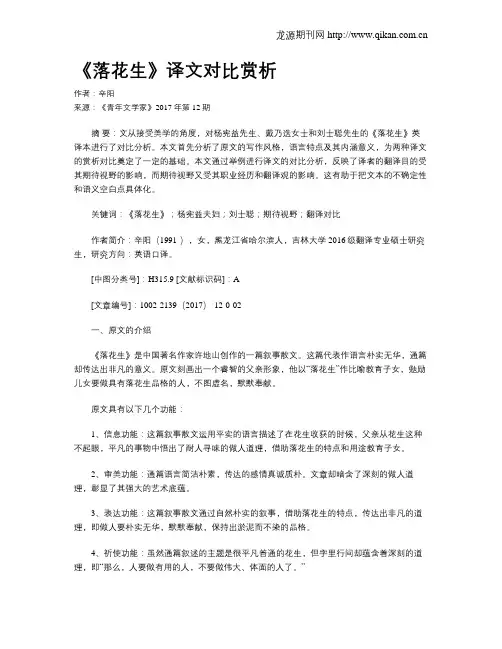
《落花生》译文对比赏析作者:辛阳来源:《青年文学家》2017年第12期摘要:文从接受美学的角度,对杨宪益先生、戴乃迭女士和刘士聪先生的《落花生》英译本进行了对比分析。
本文首先分析了原文的写作风格,语言特点及其内涵意义,为两种译文的赏析对比奠定了一定的基础。
本文通过举例进行译文的对比分析,反映了译者的翻译目的受其期待视野的影响,而期待视野又受其职业经历和翻译观的影响。
这有助于把文本的不确定性和语义空白点具体化。
关键词:《落花生》;杨宪益夫妇;刘士聪;期待视野;翻译对比作者简介:辛阳(1991-),女,黑龙江省哈尔滨人,吉林大学2016级翻译专业硕士研究生,研究方向:英语口译。
[中图分类号]:H315.9 [文献标识码]:A[文章编号]:1002-2139(2017)-12-0-02一、原文的介绍《落花生》是中国著名作家许地山创作的一篇叙事散文。
这篇代表作语言朴实无华,通篇却传达出非凡的意义。
原文刻画出一个睿智的父亲形象,他以“落花生”作比喻教育子女,勉励儿女要做具有落花生品格的人,不图虚名,默默奉献。
原文具有以下几个功能:1、信息功能:这篇叙事散文运用平实的语言描述了在花生收获的时候,父亲从花生这种不起眼,平凡的事物中悟出了耐人寻味的做人道理,借助落花生的特点和用途教育子女。
2、审美功能:通篇语言简洁朴素,传达的感情真诚质朴。
文章却暗含了深刻的做人道理,彰显了其强大的艺术底蕴。
3、表达功能:这篇叙事散文通过自然朴实的叙事,借助落花生的特点,传达出非凡的道理,即做人要朴实无华,默默奉献,保持出淤泥而不染的品格。
4、祈使功能:虽然通篇叙述的主题是很平凡普通的花生,但字里行间却蕴含着深刻的道理,即“那么,人要做有用的人,不要做伟大、体面的人了。
”二、两种英译本对比分析原文的语言简洁平实,杨宪益夫妇和刘士聪先生的译文都秉承了原文的语言风格。
但他们译文的翻译风格有所区别。
接受美学的翻译观强调从读者的角度切入,要求译者把作者,作品和读者融为一体。

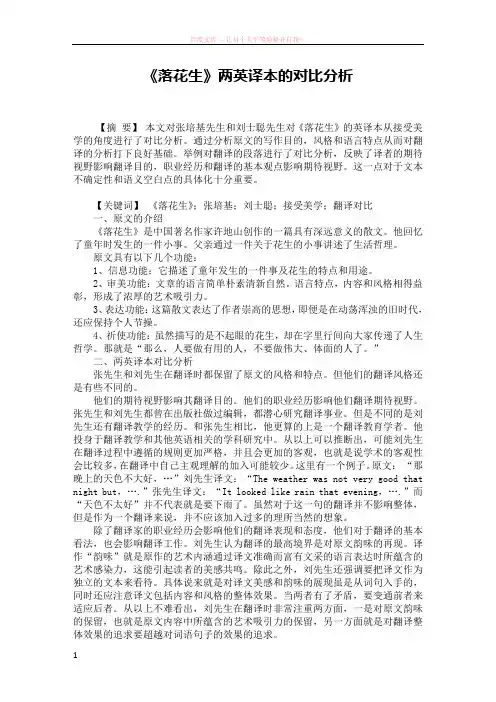
《落花生》两英译本的对比分析【摘要】本文对张培基先生和刘士聪先生对《落花生》的英译本从接受美学的角度进行了对比分析。
通过分析原文的写作目的,风格和语言特点从而对翻译的分析打下良好基础。
举例对翻译的段落进行了对比分析,反映了译者的期待视野影响翻译目的,职业经历和翻译的基本观点影响期待视野。
这一点对于文本不确定性和语义空白点的具体化十分重要。
【关键词】《落花生》;张培基;刘士聪;接受美学;翻译对比一、原文的介绍《落花生》是中国著名作家许地山创作的一篇具有深远意义的散文。
他回忆了童年时发生的一件小事。
父亲通过一件关于花生的小事讲述了生活哲理。
原文具有以下几个功能:1、信息功能:它描述了童年发生的一件事及花生的特点和用途。
2、审美功能:文章的语言简单朴素清新自然。
语言特点,内容和风格相得益彰,形成了浓厚的艺术吸引力。
3、表达功能:这篇散文表达了作者崇高的思想,即便是在动荡浑浊的旧时代,还应保持个人节操。
4、祈使功能:虽然描写的是不起眼的花生,却在字里行间向大家传递了人生哲学。
那就是“那么,人要做有用的人,不要做伟大、体面的人了。
”二、两英译本对比分析张先生和刘先生在翻译时都保留了原文的风格和特点。
但他们的翻译风格还是有些不同的。
他们的期待视野影响其翻译目的。
他们的职业经历影响他们翻译期待视野。
张先生和刘先生都曾在出版社做过编辑,都潜心研究翻译事业。
但是不同的是刘先生还有翻译教学的经历。
和张先生相比,他更算的上是一个翻译教育学者。
他投身于翻译教学和其他英语相关的学科研究中。
从以上可以推断出,可能刘先生在翻译过程中遵循的规则更加严格,并且会更加的客观,也就是说学术的客观性会比较多,在翻译中自己主观理解的加入可能较少。
这里有一个例子。
原文:“那晚上的天色不大好,…”刘先生译文:“The weather was not very good that night but,….”张先生译文:“It looked like rain that evening,….”而“天色不太好”并不代表就是要下雨了。
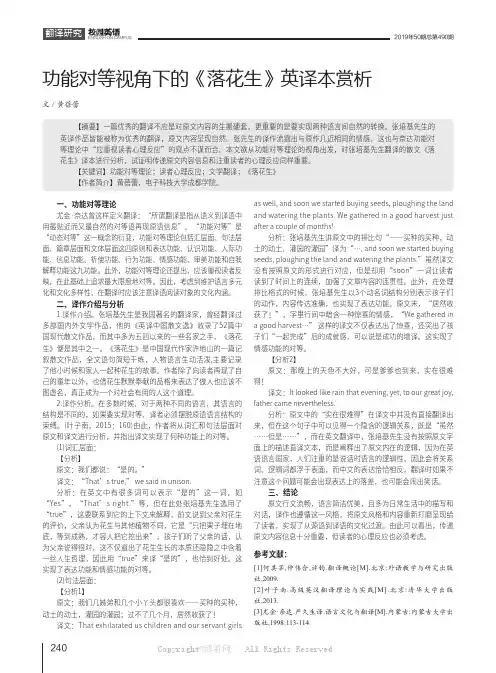
2402019年50期总第490期ENGLISH ON CAMPUS功能对等视角下的《落花生》英译本赏析文/黄蓓蕾as well, and soon we started buying seeds, ploughing the land and watering the plants. We gathered in a good harvest just after a couple of months!分析:张培基先生讲原文中的排比句“——买种的买种,动土的动土,灌园的灌园”译为“…, and soon we started buying seeds, ploughing the land and watering the plants.”虽然译文没有按照原文的形式进行对应,但是却用“soon”一词让读者读到了时间上的连续,加强了文章内容的连贯性。
此外,在处理排比格式的时候,张培基先生以3个动名词结构分别表示孩子们的动作,内容传达准确,也实现了表达功能。
原文末,“居然收获了!”,字里行间中暗含一种惊喜的情感,“We gathered in a good harvest…” 这样的译文不仅表达出了惊喜,还突出了孩子们“一起完成”后的成就感,可以说是成功的增译。
这实现了情感功能的对等。
【分析2】原文:那晚上的天色不大好,可是爹爹也到来,实在很难得!译文:It looked like rain that evening, yet, to our great joy, father came nevertheless.分析:原文中的“实在很难得”在译文中并没有直接翻译出来,但在这个句子中可以见得一个隐含的逻辑关系,既是“虽然……但是……”,而在英文翻译中,张培基先生没有按照原文字面上的描述直译文本,而是阐释出了原文内在的逻辑,因为在英语语言国家,人们注重的是说话时语言的逻辑性,因此会将关系词、逻辑词都浮于表面,而中文的表达恰恰相反,翻译时如果不注意这个问题可能会出现表达上的落差,也可能会闹出笑话。

《落花生》三个英译版本对照赏析《落花生》是清朝著名文学家徐志摩的一首诗歌,是他的名作之一,也是中国文学的经典之作。
这首诗凝练而优美,语言深刻,被誉为“中国诗歌的经典”,深受中外读者的喜爱。
它被译成英文,被许多外国读者所欣赏,有三个不同的英文版本,其中最著名的是陈安之翻译的《The Peanut》,以及陆小曼翻译的《The Peanuts》和顾栋翻译的《The Peanuts Fall》。
陈安之的《The Peanut》是一首抒情的诗歌,它结合了古典诗歌和浪漫主义的特色,表达了徐志摩对落花生的情怀。
整首诗歌以落花生作为中心,将落花生含蓄而优美地表达为一种哲学思想,一种精神状态,一种生活方式,将落花生的象征意义深深地吸引了读者。
陈安之将落花生比喻为一种温柔而脆弱的精神,诗歌中强调了落花生的象征意义,表达了徐志摩对生活的热情,他说:“是生命的象征,也是对梦想的追寻”。
陆小曼的《The Peanuts》则更多的是用浪漫的叙事手法来表达落花生的意义。
诗歌中,陆小曼把落花生比喻为一种希望,一种新生的力量,一种勇敢地追求梦想的精神。
诗中写道:“它是希望的新生,它是梦想的追求”,这首诗透露出徐志摩对生命的深刻理解,用浪漫的叙事手法表达对生命的感悟,使得读者能够体会到徐志摩对生活的热情和渴望。
顾栋翻译的《The Peanuts Fall》以落花生为主题,把落花生比喻为一种坚强的精神,一种坚持不懈地追求梦想的信念。
顾栋用诗歌中落花生的精神,将梦想追求的意义表达得淋漓尽致,他强调:“它是坚强的精神,它是实现梦想的信念”。
他的诗歌表达的是徐志摩对梦想的执着追求,他坚持不懈地奋斗,让落花生变成了一种精神上的“宝贵财富”。
三个不同的英文版本都将徐志摩对落花生的哲学思想和精神状态表达得淋漓尽致,把落花生的象征意义深深地吸引了读者。
从三个版本中,我们可以深刻地感受到徐志摩对生活的热情,他的诗歌象征着一种哲学思想,一种精神状态,一种生活方式,这些都是徐志摩在诗歌中渗透出来的精神。
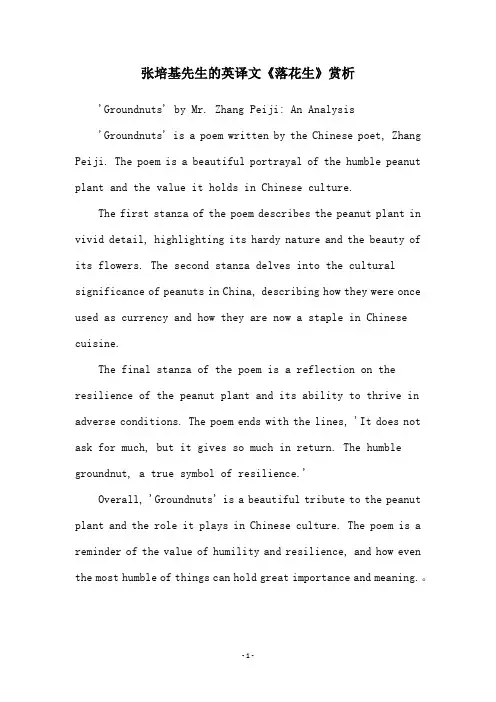
张培基先生的英译文《落花生》赏析'Groundnuts' by Mr. Zhang Peiji: An Analysis'Groundnuts' is a poem written by the Chinese poet, Zhang Peiji. The poem is a beautiful portrayal of the humble peanut plant and the value it holds in Chinese culture.The first stanza of the poem describes the peanut plant in vivid detail, highlighting its hardy nature and the beauty of its flowers. The second stanza delves into the cultural significance of peanuts in China, describing how they were once used as currency and how they are now a staple in Chinese cuisine.The final stanza of the poem is a reflection on the resilience of the peanut plant and its ability to thrive in adverse conditions. The poem ends with the lines, 'It does not ask for much, but it gives so much in return. The humble groundnut, a true symbol of resilience.'Overall, 'Groundnuts' is a beautiful tribute to the peanut plant and the role it plays in Chinese culture. The poem is a reminder of the value of humility and resilience, and how even the most humble of things can hold great importance and meaning.。
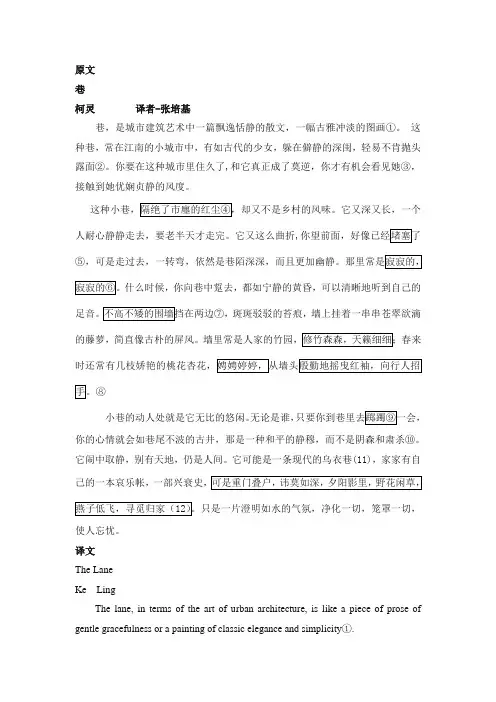
原文巷柯灵译者-张培基巷,是城市建筑艺术中一篇飘逸恬静的散文,一幅古雅冲淡的图画①。
这种巷,常在江南的小城市中,有如古代的少女,躲在僻静的深闺,轻易不肯抛头露面②。
你要在这种城市里住久了,和它真正成了莫逆,你才有机会看见她③,接触到她优娴贞静的风度。
人耐心静静走去,要老半天才走完。
它又这么曲折,什么时候,你向巷中踅去,都如宁静的黄昏,可以清晰地听到自己的斑斑驳驳的苔痕,墙上挂着一串串苍翠欲滴小巷的动人处就是它无比的悠闲。
无论是谁,你的心情就会如巷尾不波的古井,那是一种和平的静穆,而不是阴森和肃杀⑩。
它闹中取静,别有天地,仍是人间。
它可能是一条现代的乌衣巷(11),家家有自己的一本哀乐帐,使人忘忧。
译文The LaneKe LingThe lane, in terms of the art of urban architecture, is like a piece of prose of gentle gracefulness or a painting of classic elegance and simplicity①.maiden of ancient times hidden away in a secluded boudoir, is reluctant to make itslong time.③taste of the countryside at all. It is long and deep, so it will take you a long while to walk patiently and quietly through it from end to end. It is also so winding that it⑤when you look far ahead, but if you keep walking until you take a turning, you’ll find it again lying endless and still more quiet. There is nothing but stillness there⑥. At any hour of day, you can even distinctly hear in the, which, moss-covered and hung with clusters of fresh green wisteria, look almost like screens of primitive simplicity. Inside the walls are residents’ gardenswith In spring,beautiful peach and apricot blossoms atop the ⑧waving their red sleeves, will sway hospitably to beckon the pedestrians.The charm of the lane lies in its absolute serenity. No matter who you are, if youin the lane for a while⑨, your mind will become as unruffled as theancient well at the end of the lane. There you a kind of peaceful calmness rather than gloomy sternness⑩. There reigns peace and quiet in the midst of(11)where each family, secluded behind closed doors, has its own(12)The all-pervading and all-purifying atmosphere of water-like placidness makes one forget all cares and worries.评析:1、明喻(simile).中文中"巷,是…"与英文中"like"相对应。
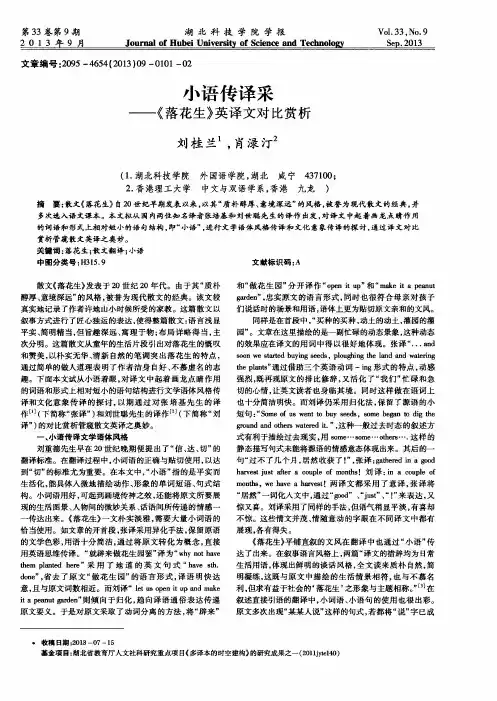
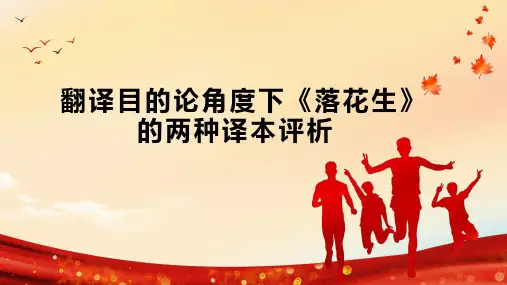
《落花生》翻译比较与赏析《落花生》是许地山(1893-1941)的散文作品之一,在这篇文章中,作者用朴实有力的文字,从花生的平凡而有用谈到了做人的哲学道理。
下面对刘士聪、张培基和杨宪益三位大家的译文稍作赏析:1.首先就文章题目“落花生”来说,“落花生”只是花生的一种别名,有“Peanuts”和“The Peanut”两种译法,Peanuts或许能够让我们联想到摆放在桌上的一碟花生,而“The Peanut”不仅能让人联想到花生的果实,还能让人想到花生的茎、叶等,所以“The Peanut”更适合做标题。
2.“半亩隙地”:在英文中没有“亩”的概念,相比较来说,像刘和张那样直译成“mu”,杨译的“a patch of land”在表达上更加地道、直观。
3.文章第一句话“我们屋后有半亩隙地。
”,刘译的“At the back of…”是表示在某个空间范围内的后面,例如:教室的后面放着几把伞。
(伞是在教室里面的),所以刘的表达有误。
此外,可以在母亲说之前加上“One day”,这样就不会那么突兀了。
4.“荒芜”:刘译的“let it lie idle”、张译的“let it lie waste”和杨译的“let it go wild”在结构上没什么大的区别,只是idle可能比waste更好。
5.“我们几姊弟,几个小丫头”:杨译的“we children”和刘译的“my brother,sister and I”相比较,前者更加简洁,而后者比较累赘。
在文章和作者的背景之下,这里是指作者家的仆人,三种译法“the young housemaid”, “servant girls”和“little maidservants”都是可以的。
6.“居然”可以看出作者的一种喜悦、惊讶的情感,在张和杨均用了“just”一词来表达。
7.“做一个收获节”,“如何”:妈妈提出要庆祝花生的收获,是一种建议,3个译文中,张译的“How about…”是比较可取的,但张用的“giving a party”是指邀请很多人参加的大型聚会,而文中是指小型的家庭聚会,所以是不恰当的。
《落花生》英译文对比赏析-精品文档(精品文档)《落花生》英译文对比赏析【】The paper will compare and appreciate the two English versions―Peanuts written by Xu Dishan from the perspective of aesthetic process. The article will specifically appreciate these two English versions from these following three processes:cognition, process and reproduction. The translation of prose needs consideration of aesthetics and only in this way can the translators achieve an excellent likeness with the original text.一、关于落花生《落花生》是现代散文家许地山先生的杰作,发表于20世纪20年代,正是由于其“质朴淳厚、意境深远”,而被誉为现代散文的经典。
《落花生》一文主要追忆作者年幼时,父亲以花生为榜样,来告诫子女做人真理。
父亲的话对作者一生影响深远。
这篇散文以叙事的方式,进行了独具匠心的表达,语言平实、简明精当,但意趣深远,寓理于物。
本文从翻译美学理论之翻译审美过程来对《落花生》两个英译本进行对比赏析,分别为张培基先生译本(以下简称“张译”),刘士聪先生译本(以下简称“刘译”),来领略散文英译的妙处。
二、关于翻译美学之翻译审美过程1.认识。
要想成功地传译原文所具备的美学信息,须对源语有深刻、彻底地认识。
而这种认识既包括原文语言结构美,也包括风格、意境和文化内涵之美。
总之,译文一定要与原文达到“神似”的境界。
落花生三篇译文赏析标题:落花生译文一:Peanuts译文二:The Peanut译文三:The Peanut赏析:the+单数名词:以个别别的、具体的实务来象征一些相关的综合的抽象事物。
结合语境:“爹爹接下去说:‘所以你们要像花生,’‘要做有用的人。
’”文章主要是赞扬花生这一物种的优良品格,The Peanut象征落花生的精神,所以The Peanut比Peanuts要好。
选段一:我们屋后有半亩隙地。
母亲说,“让它荒芜着怪可惜,既然你们那么爱吃花生,就辟来做花生园罢。
”我们几姊弟和几个小丫头都很喜欢——买种的买种,动土的动土,灌园的灌园;过不了几个月,居然收获了!译文一:Behind our house there lay half a mu of vacant land. Mother said, "It's a pity to let it lie waste. Since you all like to eat peanuts so much, why not have them planted here. “That exhilarated us children and our se rvant girls as well, and soon we started buying seeds, ploughing the land and watering the plants . We gathered in a good harvest just after a couple of months!译文二:At the back of our house there was half a mu of vacant land. "It’s a pity to let it go to w aste like that,” Mother said. "Since you all enjoy eating peanuts, let us open it up and make it a peanut garden." At that my brother, sister and I were all delighted and so were the young housemaids. Some went to buy seeds, some dug the ground and others watered it and, in a couple of months, we had a harvest!译文三:Behind our house there was a patch of land. "It would be a pity to let it go wild.” said Mother. “I suggest that since you are all so fond of peanuts you should grow some there.”We children and the little maidservants were all delighted. Some of us bought seeds, some dug up the plot and others watered it. In just a few months we had a harvest.赏析:“屋后”从逻辑上讲应该是房子的“后面”Behind,而不是房间的“后部”At the back of。
基于彼得.纽马克关联法的刘世聪《落花生》英译本赏析摘要:我国著名作家许地山先生的《落花生》是一篇脍炙人口的经典散文,其语言平实,故事情节娓娓道来,主题鲜明深刻。
该作品自问世以来,不仅深受广大国内读者的喜爱与好评,也被翻译成多个英语版本在国外广为流传。
在各个译本中,刘世聪所译版本在词汇,语法,语篇上与原文贴近程度高,在传情达意上颇为成功,是汉英散文翻译的典范。
本文将基于彼得.纽马克的关联法从词汇,语法和语篇三个角度对《落花生》进行赏析。
关键词:落花生;关联法;词汇;语法;语篇介绍许地山先生的名作《落花生》采用口语化的语言,讲述了作者小时候一件关于花生的故事,通过花生揭示了深刻的人生道理。
文中朴素的语言所营造的温馨和睦的家庭氛围,揭示出的深刻的人生哲理是广大读者终身受用的。
翻译《落花生》关键是要译出原文朴素自然地语言风格,并流畅自然地引出原文发人深省的道理。
刘世聪先生因其对英汉两种语言的熟练掌握和深厚的文学功底,翻译的《落花生》无论从词汇,语法还是语篇衔接层面看,都成功地做到了与原文的贴近,是一篇汉英散文翻译的典范之作。
关联法是由英国当代著名翻译家,翻译理论家彼得.纽马克提出的。
纽马克最著名的翻译理论是语义翻译和交际翻译,但这种二分法的翻译理论在实践中被证明是太过抽象概括,因为任何翻译都是从字词句着手的,而上述理论似乎走得太远。
所以他综合语义翻译和交际翻译,提出了关联翻译法。
纽马克对关联法的基本定义:原作或译语文本的语言越重要,就越要紧贴原文翻译(the more import ant the langua ge of the origin al or source langua ge text, the more closel y it should be transl ated).他对重要的界定是指语言表示出“特别有价值、特别有意义、特别必须、或永恒”的事物(New mark, 1991:2)。
中英对照英国散文欣赏中英对照英国散文欣赏(一)(编者注:以下中英对照英国散文选段摘自杨自伍编的《英国散文名篇欣赏》,其中有些译文编者根据自己所好重新作了翻译,目的一是让年轻人知道有这么本好书,也许他们会自己找来阅读;二是让成天钻在英语考题中的初三至高三的同学们了解到:英语中原来还有这么美好的东西,远比他们的练习题和考卷有趣。
文章后面摘录的英语单词,只须按一下电子辞典就明白了。
)1. I went out in the afternoon. It was too early in the year fora heavy fallof leaves, but nevertheless the garden was covered. They were washed to the sides of the roads, and lay heaped up over the road-gratings, masses of gorgeous harmonies in red, brown, and yellow. The chestnuts andacorns dropped in showers, and the patter on the gravel was a little weird.The chestnut husks split wide open when they came to the ground,revealing the polished brown of the shy fruit.(nevertheless, gorgeous, harmony, weird, reveal, polish)这天下午我信步出门。
还不到一年中落叶纷飞的季节,花园却已被枯叶覆盖。
它们被雨水冲到路边,堆积在阴沟格栅上,红色的,褐色的,黄色的,一堆堆,一丛丛,既绚丽多彩,又和谐悦目。
橡实雨点般纷纷坠下,嗒嗒地拍打在鹅卵石上,给人一种神秘感。
英语散文赏析《落花生》双语散文阅读
Peanuts
Xu Dishan
我们屋后有半亩隙地。
母亲说:“让它荒芜着怪可惜,既然你们那么爱吃花生,就辟来做花生园罢。
” 我们几姐弟和几个小丫头都很喜欢——买种的买种,动土的动土,灌园的灌园;过不了几个月,居然收获了!
Behind our house there lay half a mu of vacant land. Mother said, “It’s a pity to let it lie waste. Since you all like to eat peanuts so very much, why not plant some here?” That exhilarated us children and our servant girls as well, and soon we started buying seeds, ploughing the land and watering the plants. We gathered in a good harvest just after a couple of months!
母亲说:“今晚我们可以做一个收获节,也请你们爹爹来尝尝我们的新花生,如何?”我们都答应了。
母亲把花生做成好几样的食品,还吩咐这节期要在园里的茅亭举行。
Mother said, “How about giving a party this evenin g to celebrate the harvest and inviting your Daddy to have a taste of our newly-harvested peanuts?” We all agreed. Mother made quite a few varieties of goodies out of the peanuts, and told us that the party would be held in the thatched pavilion on the peanut plot.
那晚上的天色不太好,可是爹爹也来到,实在很难得!
It looked like rain that evening, yet, to our great joy, father came nevertheless.
爹爹说:“你们爱吃花生吗?”
“Do you like peanuts?” asked father.
我们都争着答应:“爱!”
“Yes, we do!” we vied in giving the answer.
“谁能把花生的好处说出来?”
“Which of you could name the good things in peanuts?”
姐姐说:“花生的气味很美。
”
“Peanuts tastes good,” said my elder sister.
哥哥说:“花生可以制油。
”
“Peanuts produce edible oil,” said my elder brother.
我说:“无论何等人都可以用贱价买它来吃;都喜欢吃它。
这就是它的好处。
”
“Peanuts are so cheap,” said I, “that anyone can afford to eat them. Peanuts are everyone’s favorite. That’s why we call peanuts good.”
爹爹说:“花生的用处固然很多;但有一样是很可贵的。
这小小的豆不像那好看的苹果、桃子、石榴,把它们的果实悬在枝上,鲜红嫩绿的颜色,令人一望而发生羡慕的心。
他只把果子埋在地底,等到成熟,才容人把他挖出来。
你们偶然看见一棵花生瑟缩地长在地上,不能立刻辨出他有没有果实,非得等到你接触他才能知道。
”
“It’s true that peanuts have many uses,” said father, “but they’re most beloved in one respect. Unlike nice-looking apples, peaches, and pomegranates, which hang their fruit on branches and win people’s admiration with their brilliant colors, tiny little peanuts bury themselves underground and remain unearthed until they’re ripe. When you come upon a peanut plant lying curled up on the ground, you can never immediately tell whether or not it bears any nuts until you touc h them.”
我们都说是的,母亲也点点头。
“That’s true,” we said in unison. Mother also nodded.
父亲接下去说:“所以你们要像花生,因为它是有用的,不是伟大、好看的东西。
”
“So you must take after peanuts,” father continued, “because
they’re useful though not great and nice-looking.”
我说:“那么,人要做有用的人,不要做伟大、体面的人了。
”
“Then you mean one should be useful rather than great and nice-looking,” I said.
父亲说:“这是我对你们的希望。
”
“That’s what I expect of you,” father concluded.
我们谈到夜阑才散,所有花生食品虽然没有了,然而父亲的话现在还印在我心版上。
We kept chatting until the party broke up late at night. Today, though nothing is left of the goodies made of peanuts, father’s words remain engraved in my mind.
知识拓展:
作者简介
许地山(1894-1941),名赞堃,字地山,笔名落华生(古时“华”同“花”,所以也叫落花生),中国现代著名小说家、散文家、“五四”时期新文学运动先驱者之一。
《落花生》是一篇叙事散文,描述了一家人收获花生的情景,通过谈论花生的好处,借物喻人,揭示了花生不图虚名、默默奉献的品格,说明人要做有用的人,不要做只讲体面而对别人没有好处的人,表达了作者不为名利,只求有益于社会的人生理想和价值观。